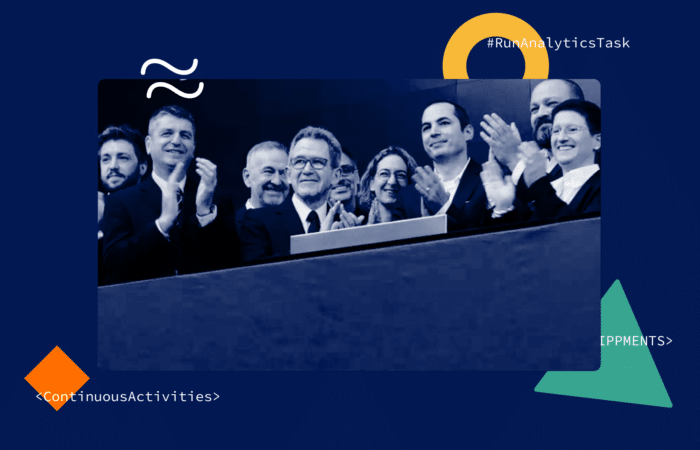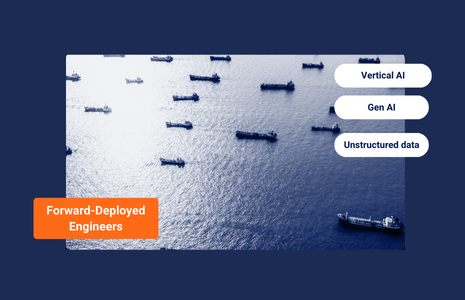Criminals don’t waste a good crisis

What’s inside?
Regardless of their location on land, in the sky or at sea, criminals have one thing in common: they will always try to exploit weaknesses.
As the stakes get higher, the novel ways in which criminals try to circumvent the systems and securities that protect us change. This forces law enforcement agencies and businesses to challenge the way they view modern-day criminals and change the way they react to them.
Today, to protect borders and businesses, organizations and law-enforcement agencies must take a preemptive approach toward criminals. By working together in new ways, businesses and governments can outsmart the cleverest of criminal minds, keeping not only borders, but businesses safe.
Criminals at sea
The vastness of the waters and the relative isolation of vessels travelling through the ocean makes the open waters appealing for criminals. Today criminals evade sanctions, smuggle drugs, fish illegally, and engage in human trafficking, putting many players across the supply chain, and the public, at-risk. Banks that finance illegal transactions unwittingly, charterers whose cargo might be seized, and even the crew on-board a sanctions-violating vessel are all exposed to criminal charges.
Supply chain vulnerabilities provide an opening for exploitation, and criminals are exceptionally skilled at seizing opportunities to carry out illegal activities and launder earnings. Poor seaside security in a port becomes an opportunity to attach drugs to the hull; Transshipment in open seas is a chance to disguise the true origin of the cargo; A congested port can be used to discreetly discharge where scrutiny might be lower.
A recent article by marine P&I insurer, North noted that “smuggling by sea has been a problem for years, but in recent years there have been some high-profile cases and evidence that the methods used are constantly evolving”

Never waste a good crisis
What governments and businesses view as a crisis is often perceived as an opportunity for criminals. COVID-19 is changing the way businesses operate, particularly those involved in shipping. The impact of this has been felt particularly in the rise of drug-related activities in the ocean. According to the UN Office of Drugs and Crime (UNODC), COVID-19 is changing the route of illicit drug flows, sending drug smugglers to look for alternative routes, including maritime ones.
Since mid-March, European authorities have seized at least seven vessels carrying drugs from South America, worth over half a billion EUR. A coincidental correlation to COVID-19 lockdowns? Probably not according to Michael O’Sullivan, Executive Director of Maritime Analysis and Operations Centre Narcotics (MAOC N), the European agency tasked with coordinating operations against drug trafficking from South America:
“By some theories, it [drug trafficking] would diminish because of the dangers. It doesn’t work that way. I think they [criminals] are working on the principle of never wasting a good crisis. And they see a lot of the law enforcement tied down, distracted, probably slightly overwhelmed by the Covid-19 crisis, so they continue with business as usual. They may even expand and increase maritime drug trafficking.”
According to O’Sullivan, many of these smuggling operations were not spontaneous but were triggered by the opportunities created by recent events. Preparations, however, long predated the current situation.
The case of the MV Karar
To understand if the rise in drug-related operations at sea is random, we examined the recent interception of the MV KARAR by Spanish Authorities.
This past April, the 65-meter supply vessel was stopped as it was heading to Spain from Venezuela. Onboard authorities discovered 4 tons of cocaine, and subsequently arrested 28 people with ties to an international drug-smuggling ring. According to media reports, the Karar was going to offload its cargo to smaller boats off the coast of Portugal and Northern Spain for further distribution, acting as a ‘mothership’ for the smuggling operation.
While the involvement of the Karar in drug smuggling is undeniable, the deceptive shipping practices and voyage irregularities displayed by this vessel started before the 3-week journey to Spain, and long before COVID-19 pandemic began spreading.

In April 2019, exactly one year before being seized by Spanish authorities, the Karar changed from a U.S. flag to that of Togo shortly after arriving in Panama from Colombia. Since April 2019, the Karar remained anchored 400 meters offshore Colon, Panama. While other vessels of its type regularly visit ports on a weekly basis, the Karar never went into port. In fact, the Karar went dark for the six months leading up to the smuggling operation.
Long story short: the Karar was waiting. For what? An opportunity.
Based on open sources alone, it would be difficult to determine when exactly the vessel switched hands and began preparations for the transportation of 4 tons of cocaine. It could have been around the Karar’s arrival in Panama in February 2019, when it changed flags in April 2019, when it changed ownership in May 2019, or when it turned off transmissions for 6 months from October 2019. Even if the vessel was designated for a smuggling operation only weeks prior to departure, the suspicious behavior was there long before.
Path of least resistance
The successful interception of a vessel is, in a way, the starting point for the next smuggling operation. According to O’Sullivan, “It’s business as usual for the traffickers, but they learn from their mistakes, as we all learn from our mistakes … if they have vessels caught in a certain area, they will tend to move it to another area to test that perimeter for weakness … They’re willing to spend quite a lot of money on losing shipments because they’ve got lots of drugs and sell at a high profit.”

These criminals, like in many other cases, were merely waiting for the right opportunity. This time, COVID-19, but next time it will be something else. Criminals will always find something to exploit.
In this ongoing cat-and-mouse game, there are a few things businesses can do to shift the balance of power, and staying on top of changes in international trade patterns is one of those things. By identifying patterns of navigation as well as understanding potential vulnerabilities, government agencies and businesses will be able to improve their ability to stay safe, even in times of crisis.
Ultimately, technology is key to moving from a reactive to proactive mode of operation, and empowering analysis and decision-making abilities will help businesses stay ahead of their adversaries. As to measuring your success, O’Sullivan has a simple tip:
“You know you’re doing the right thing when you start seizing vessels. When you’re not seizing vessels, then you know we’ve got to do something different.”
Listen to the full conversation with Michael O’Sullivan on Beyond Borders










